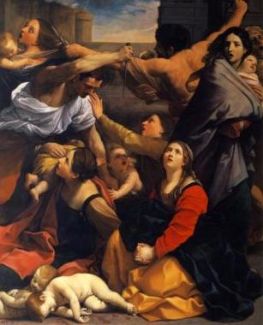 Today’s readings for mass are hard to think about, because the scriptures are about the massacre of the Holy Innocents. Today’s readings are in memory of all the little babies that died when Christ was born. Their innocent lives were taken from them in such a brutal and terrifying way. Can you imagine the terror and suffering the parents of these children went through? Who could murder innocent little babies like this on such a widespread scale? Herod was a man without a conscience. He also killed his father in law, his wife and sons too. He killed anyone who was a threat to his position of power as the king of Judea.
Today’s readings for mass are hard to think about, because the scriptures are about the massacre of the Holy Innocents. Today’s readings are in memory of all the little babies that died when Christ was born. Their innocent lives were taken from them in such a brutal and terrifying way. Can you imagine the terror and suffering the parents of these children went through? Who could murder innocent little babies like this on such a widespread scale? Herod was a man without a conscience. He also killed his father in law, his wife and sons too. He killed anyone who was a threat to his position of power as the king of Judea.
King Herod did not become a man without a conscience overnight though. No one is born an evil person. Many factors contributed to the person he became, a person who could ruthlessly kill anyone who got in his way. Herod sounds like a spoiled child that grew up.
The Catechism of the Catholic church teaches us that there is such a thing as a malformed conscience: (cc 1790 – 1793)
“Ignorance of Christ and his Gospel, bad example given by others, enslavement to one’s passions, assertion of a mistaken notion of autonomy of conscience, rejection of the Church’s authority and her teaching, lack of conversion and of charity: these can be at the source of errors of judgment in moral conduct.” (cc 1792)
King Herod was obviously ignorant of Christ and his gospel, was raised by parents who did not worship God, and was taught by his parents that as king, he had the right to make whatever decisions he felt was right. The only example he would have had as a child would have been a bad example, by his parents who rejected God. His parents were probably a little too indulgent to his whims too and spoiled the little future king.
King Herod is a perfect example of what the Catechism of the Catholic Church teaches is a malformed conscience. There are many people in our world today that have committed unspeakable crimes. It is easy to judge what kind of person they are, by their crimes, but if we knew their background and the circumstances of their lives and why their conscience was not formed correctly, we might not judge them quite as harshly. The evil acts they have committed remain no less evil, but the culpability of their acts are reduced.
The Catechism states:
“If – on the contrary – the ignorance is invincible, or the moral subject is not responsible for his erroneous judgment, the evil committed by the person cannot be imputed to him. It remains no less an evil, a privation, a disorder. One must therefore work to correct the errors of moral conscience.” (cc 1793)
For a sin to be mortal ( cc 1857) these three conditions must be present:
1. A grave matter.
2. Full knowledge.
3. Deliberate consent.
If these three conditions are not met, the sin becomes venial, no matter what the gravity of the sin may be. (cc 1860)
Full knowledge would have been difficult for Herod to have, if he was raised by parents who rejected God and taught him there was no ultimate authority in life other than himself. Only God can judge this intrinsically evil act that king Herod committed.
This is one of the reasons why Catholics do not believe in the death penalty, even for the most serious of crimes. Prison ministry is the Catholic church’s outreach to those who have committed serious crimes, including inmates on death row. Christ does not want anyone to be lost, but to come to the fullness of the truth. (cc 1037) (2 Pt 3:9)
“One must therefore work to correct the errors of moral conscience.” (cc 1793) Christ also commanded us to visit those in prison (Mt 25: 34-40) and that this would be one of the criteria that he will judge our lives by.
Today, when we remember the massacre of the Holy Innocents, the babies who died for Christ, let us also remember all the martyrs who willingly died for Christ. What did they die for? That others may come to know Jesus, by their refusal to deny him? The martyrs gave witness to the fact that Jesus Christ is truly the son of God, by their deaths. Their deaths brought a greater knowledge and awareness of Christ, to all whose lives they touched. May we who have received this gift, share it with those who need Him the most. Christ’s unfathomable mercy is without limits.
1 Jn 1: 5-22
Ps 124: 2-3, 4-5, 7cd-8
Mt 2: 13-18
* Scripture references used for the Catholic Mass Readings and Reflections are from the New Revised Standard Version Bible: Catholic Edition.
